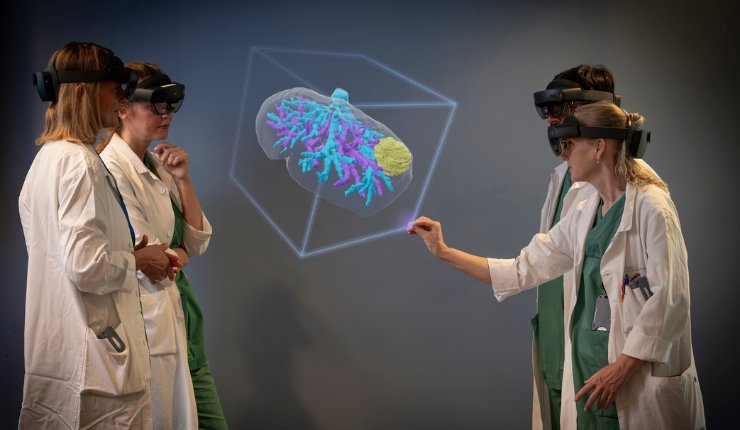Hologram Technology for Surgical Planning Granted EU Funding

An historic EU grant of €8.9 million has been awarded to HoloSurge, an innovative four-year project exploring the use of organ hologram technology when planning operations.
The grant, which is one of the largest EU research and innovation grants to be awarded in recent history, was allocated by Horizon Europe, a transnational research and innovation funding body with a total funding pot of €80 billion.
It will fund the further development of the technology with the aim to power informed surgical decision making by being able to view 3D holograms of patients’ organs through augmented reality headsets.
HoloSurge draws upon the expertise of 14 European leaders in technology and healthcare leaders, united in their shared ambition to reduce the risk of complications during planned surgery.
The technology was developed by Norwegian medtech company HoloCare. Innovation Director Jahn Otto commented: “Innovation has long been the foundation for prosperity in Europe, from the breakthroughs improving healthcare to the technological advances growing our economy.
“In essence, Horizon Europe is not just about funding; it’s about forging connections, driving innovation, and shaping the future of healthcare. This not only opens doors for collaboration with the EU but also with Norway.
The HoloSurge partnership stands as a testament to this. Through joint efforts with experts from the EU, UK and Norway, we’re aiming to use our hologram technology to transform the surgical outcomes of individuals worldwide.
“Our hope is that it can be adapted to benefit a wider range of surgeries in the future.”
The technology allows surgeons to tailor operations to individual patients’ anatomy
Viewing patients’ organs as a 3D hologram allows surgeons to move, rotate, and expand the image, granting them multiple viewpoints and the ability to plan operations more efficiently and accurately.
Furthermore, multiple clinicians can access the hologram at the same time from various locations, meaning multi-disciplinary teams can liaise with external specialists to explore and find solutions to potential surgical challenges in advance.
In initial trials at five European hospitals, including Leeds Teaching Hospital Trust, where the hologram technology is being used for liver surgeries, there has been a reported 74% reduction in the time take to align organs during surgery when using HoloCare’s AR images compared to MRI scans.
Prof David Jayne, Professor of Surgery at the University of Leeds and Hon. Consultant Surgeon at Leeds Teaching Hospitals NHS Trust, said:
The HoloCare technology is an exciting advance in how we treat cancer patients with the potential to transform surgical care. The superior anatomical knowledge gained from the technology will enable more precise surgery with better cancer outcomes for patients.
It is hoped that one day, the technology can also be superimposed into the patient during surgery as a live reference point to improve accuracy and intraoperative navigation.
There are opportunities to improve for surgery for liver cancer
As the main treatment for liver cancer, surgery can extend the lives of patients by up to ten years. In cases where surgery isn’t an option, patients may undergo palliative chemotherapy which typically offers around three years of survival.
Using HoloCare’s hologram technology, there is potential to reduce surgical complications, including infection, bleeding, organ damage, and death, which currently affect up to 48% of liver surgeries and 60% of pancreatic surgeries.
Traditional imaging methods such as ultrasound, MRI, and CT scans, can limit surgeons in their ability to spot critical details due to their two-dimensional nature. Around 40% of all lesions in the tail of the pancreas currently go unnoticed using ultrasound technology.
Over a four-year-period, the 14 HoloSurge partners will support the integration of the technology into existing surgical workflows, ensuring regulatory compliance, clinical validation, and technical optimisation for widespread adoption in liver and pancreatic cancer surgeries.

